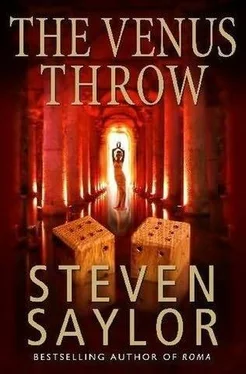Steven Saylor - The Venus Throw
Здесь есть возможность читать онлайн «Steven Saylor - The Venus Throw» весь текст электронной книги совершенно бесплатно (целиком полную версию без сокращений). В некоторых случаях можно слушать аудио, скачать через торрент в формате fb2 и присутствует краткое содержание. Жанр: Исторический детектив, на английском языке. Описание произведения, (предисловие) а так же отзывы посетителей доступны на портале библиотеки ЛибКат.
- Название:The Venus Throw
- Автор:
- Жанр:
- Год:неизвестен
- ISBN:нет данных
- Рейтинг книги:3 / 5. Голосов: 1
-
Избранное:Добавить в избранное
- Отзывы:
-
Ваша оценка:
- 60
- 1
- 2
- 3
- 4
- 5
The Venus Throw: краткое содержание, описание и аннотация
Предлагаем к чтению аннотацию, описание, краткое содержание или предисловие (зависит от того, что написал сам автор книги «The Venus Throw»). Если вы не нашли необходимую информацию о книге — напишите в комментариях, мы постараемся отыскать её.
The Venus Throw — читать онлайн бесплатно полную книгу (весь текст) целиком
Ниже представлен текст книги, разбитый по страницам. Система сохранения места последней прочитанной страницы, позволяет с удобством читать онлайн бесплатно книгу «The Venus Throw», без необходимости каждый раз заново искать на чём Вы остановились. Поставьте закладку, и сможете в любой момент перейти на страницу, на которой закончили чтение.
Интервал:
Закладка:
"But there was a death in this house, wasn't there? Dio's slave, his taster-"
"Worthless slave died of natural causes, and that's the end of it." "Then why did Dio move on to the house of Titus Coponius?" "Because Dio was frightened by his own shadow. Saw a stick on
the ground, swore it was a snake." Lucceius snorted. "Dio was as safe here as a virgin in the House of the Galli. That's the beginning and end
of it."
"And yet, Dio believed that someone in this house tried to poison
him."
"Dio had no damned sense. Look what happened to him at Coponius's house, then tell me where he was safer!"
"I see your point. You were good friends, then, you and Dio?"
"Of course! What do you think, I'd ask an enemy to sleep under my roof? He'd sit here during the day, where you're sitting now, and we'd talk about Aristotle, or Alexandria, or Carthage in the days of Hannibal. Gave me some good ideas for my history." Lucceius looked aside and bit his lip. "Wasn't a bad fellow. Sorry to see him go. Of course he did have some nasty habits." He smiled grimly. "Picking the fruit before it's ripe and all that."
"What do you mean?"
"Never mind. No point gossiping about the dead." " 'Picking the fruit…'?"
"Liked them young. One of those. Nothing wrong in that, except a man should keep his hands off what belongs to his host. I'll say no more." From his face I could see that he meant it.
"You said that Dio's slave died of natural causes. What killed him?"
"How should I know?"
"But a death in the house — "
"The death of a slave, and another man's slave at that." "Surely someone noted the symptoms."
"What do you think, I summon a fancy Greek physician every time a slave has a stomach ache? Slaves take ill every day, and sometimes they die."
"Then you can't be sure that it wasn't poison. Dio thought so."
"Dio thought lots of things. Had quite an imagination-made a better philosopher than historian."
"Still, if someone in the household could tell me exactly how the slave died, what he complained of before the end-"
I was stopped by the look on Lucceius's face. He stared at me for a long moment. His bushy eyebrows gathered above his squinting eyes. "Who sent you here?"
"I'd rather not say."
"Wasn't Cicero, was it?"
"I come as a friend of Dio's."
"Meaning that I wasn't? Get out."
"My only interest is discovering the truth about Dio's death. If you were truly his friend-"
"Get out! Well, go on. Up! Out!" Lucius Lucceius picked up a stylus and waved it like a dagger, glowering at me as I stood and walked to the door. I left him bent over his scrolls, muttering angrily to himself.
The slave who had shown me in was waiting in the hallway to show me out, but before we reached the foyer a formidably large woman stepped into the hallway and blocked our path.
"Go on, Cleon," she said to the slave. "I'll show the visitor out myself." From the tone of her voice she was clearly the mistress of the house, and from the slave's obsequious manner as he backed away I gathered she was not the sort of Roman matron who allowed her slaves much latitude.
Lucceius's wife was as ugly as her husband, though she looked nothing like him. Instead of bristling eyebrows she had only two lines painted above her eyes. Her hair might have been as white as his, had it not been dyed red with henna. She wore a voluminous green stola and a necklace of green glass with matching earrings. "So, you're Gordianus the Finder," she said abruptly, appraising me with a caustic gaze. "I heard the slave announce you to my husband."
"What else did you hear?" I said.
She appreciated my bluntness. "Everything. You and I should talk." I looked over my shoulder.
"Don't worry," she said, "no one eavesdrops on me in this house. They know better. Come this way."
I followed her into another wing of the house. I might as well have entered another world. Where Lucceius's study had been an austere museum of war trophies and musty documents, his wife's quarters were flamboyantly decorated with intricately embroidered hangings and precious objects of metal and glass. One long wall was painted to show a spring garden in bloom, all pale greens and soft pinks and yellows.
"You deceived my husband," she said wryly.
"He thought I came from Cicero. I didn't contradict him."
"So you merely let him believe what he wanted to believe. Yes, that's the best way to handle Lucius. He wasn't intentionally lying to you, you know. He's convinced himself that nothing untoward took place in this house. Lucius has a hard time dealing with the truth. Like most men, most of the time," she said under her breath. She walked about the room, picking things up and putting them down.
"Please, go on," I said.
"Appearances matter more than facts to Lucius.
To have had a houseguest poisoned under his roof, or even a houseguest's slave, is thinkable to him. So it simply never happened, you see.
Lucius will never, ever admit otherwise."
"But such a thing did happen?"
She stepped to a small table covered with a number of identical clay figurines. They were about the size of a child's fist and brightly painted. She picked one of them up and idly turned it over in her hand. "Who sent you here asking questions?"
"As I told your husband, a friend of Dio's."
She snorted.
"Never mind. I can guess who sent you."
"Can you?"
"Clodia. Am I right? Don't bother to answer. I can read your face as easily as I can read Lucius's."
"How could you possibly guess who hired me?"
She shrugged and twirled the little clay figurine between her fore-finger and thumb. It was a votive statue of Attis, the eunuch consort of the Great Mother, Cybele, standing with his hands on his plump belly and wearing his red Phrygian cap with its rounded, forward-sloping peak. "We have ways of sharing what we know."
'We'?"
"We women."
I felt a prickling sensation in my spine, a sense of having had the same conversation before-with Bethesda, when she told me that Clodia and Caelius were no longer lovers, and I asked her how she could possibly know such a thing: We have ways of sharing what we know. For an instant I had a glimmer of insight, as if a door had been opened just enough to let me catch a glimpse of an unfamiliar room. Then she started to talk again and the door was shut.
"There's no doubt that Dio's slave was poisoned. You should have seen the poor wretch. If Lucius had kept his eyes open instead of looking away when the man was dying, he might have a harder time making that glib pronouncement about 'natural causes.' But then Lucius has always been squeamish. He can write his little accounts of women being spitted on stakes and children being chopped into pieces at the fall of Carthage, but he can't stomach watching a slave throw up."
"Was that one of the symptoms?"
"Yes. The man turned as white as marble and went into convulsions."
"But if the slave was poisoned by tasting food intended for Dio, how did the poison get into the food?"
"It was put there by some of the kitchen slaves, of course. I think I know which ones."
"Yes?"
"Juba and Laco. Those two fellows were always up to something. Too smart for their own good. Had fantasies of buying their freedom some day. Juba must have sneaked out of the house that afternoon, because I caught him sneaking back in, and when I questioned him he tried to get out of it by playing stupid and spouting a lot of double-talk, the way slaves do. He said he'd gone to the market to fetch something, I don't remember what, and even held up a little bag to show me. What nerve! It was probably the poison. Later I caught him whispering to Laco in the kitchen and I wondered what they were up to. They're the ones who prepared the dish that killed Dio's slave."
Читать дальшеИнтервал:
Закладка:
Похожие книги на «The Venus Throw»
Представляем Вашему вниманию похожие книги на «The Venus Throw» списком для выбора. Мы отобрали схожую по названию и смыслу литературу в надежде предоставить читателям больше вариантов отыскать новые, интересные, ещё непрочитанные произведения.
Обсуждение, отзывы о книге «The Venus Throw» и просто собственные мнения читателей. Оставьте ваши комментарии, напишите, что Вы думаете о произведении, его смысле или главных героях. Укажите что конкретно понравилось, а что нет, и почему Вы так считаете.










